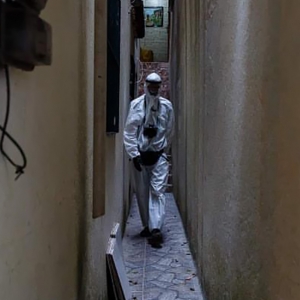The Stream, July 7, 2020: 60 Percent of Fish Species May be Unable to Survive in Current Habitats by 2100, Study Warns
The Global Rundown
A new study warns that 60 percent of fish species may be unable to survive in their current habitats by 2100. Wuhan, China raises its flood alert level after another week of torrential rain. The river Kuma in Kyushu, Japan overflows amid severe storms, leaving at least 50 people dead or missing. Pink glacial ice, which researchers say is caused by the presence of an algae that accelerates snowmelt, blankets parts of the Alps. The Italian coastguard says water quality in the Mediterranean improved significantly during the coronavirus lockdown.
“We were able to ascertain a significant improvement in the transparency of the waters and a significant reduction in suspended material. The marine environment and marine life have regained spaces that human activity had eroded.” –Lieutenant Alessandro Mino, a member of the Italian coastguard, in reference to changes in the Mediterranean that occurred during the region’s two-month coronavirus lockdown. Data gathered by the Italian coastguard shows increased water quality and an uptick in sightings of marine life near coastal areas. Reuters
Latest WaterNews from Circle of Blue
HotSpots H2O: Conflict and Covid-19 Disrupt Water Supplies in Ukraine — Aerial bombardment as part of a years-long conflict has once again upset water supplies in eastern Ukraine, leaving many civilians without running water in the midst of the Covid-19 pandemic.
What’s Up With Water – July 6, 2020 — This week’s edition of What’s Up With Water includes coverage on a state of emergency in drought-stricken Puerto Rico, the first round of payouts from Australia’s large drought resilience fund, and a new study on how climate change is impacting global water availability.
By The Numbers
40+ People killed on the southern Japanese island of Kyushu after the river Kuma breached its banks this weekend. Another 11 people were reported missing as of Monday afternoon. More heavy storms, which have so far triggered flooding and landslides, are predicted this week. The Guardian
60 percent Proportion of Earth’s fish species that will be unable to survive in their current habitats if global temperatures warm by a worst-case scenario of 4-5 °C (7.2-9 °F) by 2100, according to researchers. The study analyzed 700 types of fish and found that warming waters, which lead to lower oxygen levels, could imperil embryos and pregnant fish in a majority of the species studied. The Guardian
Science, Studies, and Reports
Glacial ice in parts of the Alps is turning pink, a phenomenon that scientists say is caused by Ancylonema nordenskioeldii algae. The algae which accelerates the rate of melting as it darkens the ice, comes at a time when glacial melting in the Alps and elsewhere is disrupting water supply in many areas worldwide. The Guardian
In context: Mountain Regions, ‘Taking the Heat,’ Face Growing Hazards As Ice Melts, UN Climate Panel Warns.
On the Radar
The Chinese city of Wuhan raised its flood alert level from a Level II to a Level III on Monday as heavy rainfall continues to inundate the country. Officials have emphasized that the coronavirus outbreak, which began in Wuhan province, will not affect the city’s flood defence network. Reuters
Kayla Ritter is a recent graduate of Michigan State University, where she studied International Relations and Teaching English to Speakers of Other Languages. She is currently based in Manton, Michigan. Kayla enjoys running, writing, and traveling. Contact Kayla Ritter





Leave a Reply
Want to join the discussion?Feel free to contribute!